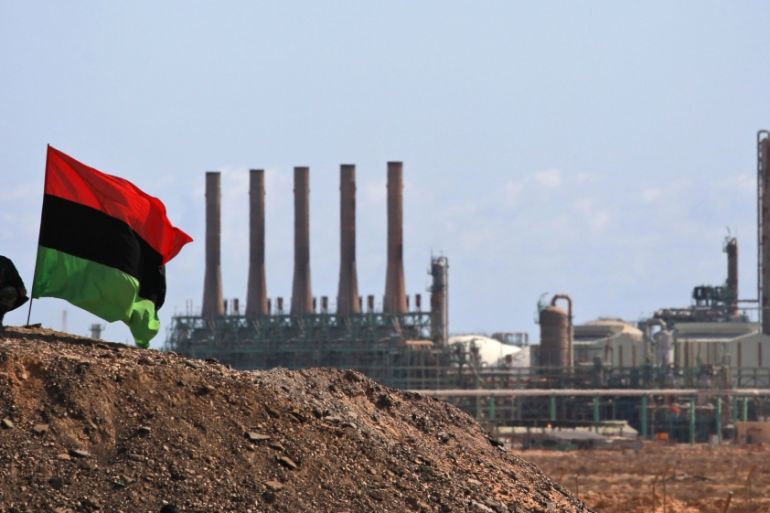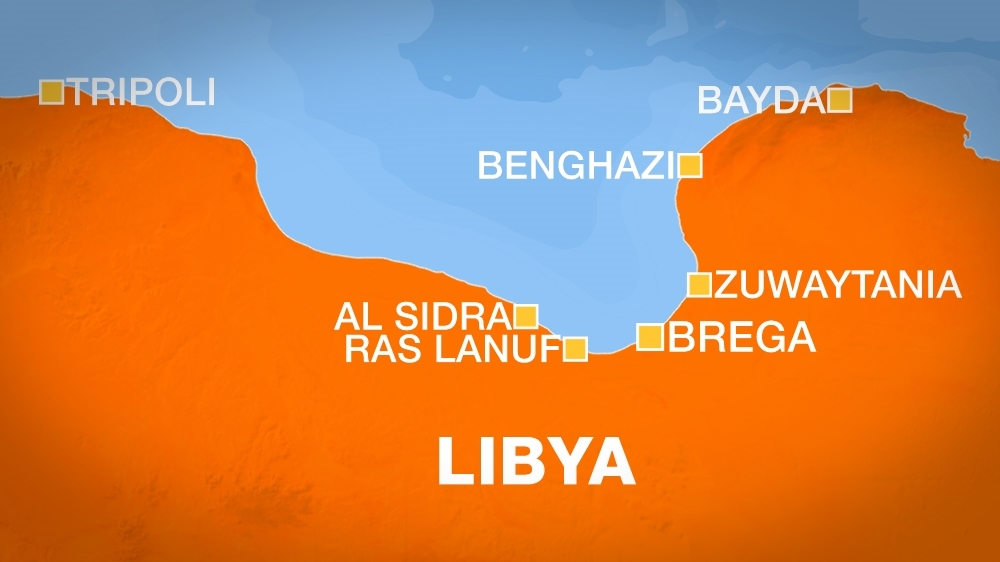Libya: Will losing oil ports end Haftar’s power?
Losing the oil ports could be an attempt to weaken Haftar, and force him to meet political rivals, analysts say.

The seizure of key oil ports in Libya’s oil crescent by the Benghazi Brigade this week has been a major blow to Libyan military commander Khalifa Haftar, Libyan analysts said.
|
|
They say that losing control over the key oil ports weakens Haftar’s position as a negotiator in possible future political talks.
Keep reading
list of 4 itemsCIA chief visits Libya after Lockerbie suspect handover
Libya: Violence to Votes
In Libya, anger and uncertainty after polls delayed
On Tuesday, the Benghazi Defense Brigade (BDB) handed over the oil refineries to the UN-backed Government of National Accord (GNA). The balance could shift in GNA’s favour and strengthen the position of prime minister Fayez al-Sarraj.
Following months of failed attempts to gain ground in the area, the BDB managed to capture the two key oil ports [Ras Lanuf and Es Sidr] on Friday after launching a surprise attack on forces loyal to Haftar.
Haftar gained control of the refineries last September after dislodging military units of the Petroleum Facilities Guard and their commander Ibrahim Jadhran, an ally of the GNA.
The strategic area, which contains a large concentration of the country’s oil production, has been a point of contention among the rival factions fighting for control of the country.
READ MORE: What is Russia’s endgame in Libya?
As of Tuesday, Libya’s oil output was on the rise with 673,200 barrels a day, according to Libya’s National Oil Corp. However, Es Sidr is the country’s largest oil port, and the clashes could affect the oil output.
Haftar, a figurehead for factions in eastern Libya who once fought beside long-time leader Muammar Gaddafi, refuses to acknowledge the political authority of the UN-sponsored Presidential Council led by Prime Minister Al-Sarraj.
Sarraj’s authority has been progressively eroding when the Tobruk-based House of Representatives (HoR), under Haftar’s direct influence, has refused twice to endorse Sarraj’s proposed list of ministers.
Haftar has engaged in a power struggle with Tripoli that has strongly weakened prospects for a unification of the country. Last month, he reportedly refused to meet Sarraj in Cairo in an Egypt-led effort to discuss a plan to end the conflict in Libya.
“Haftar’s refusal to meet with Sarraj in Cairo has led his external allies [Egypt/Emirates] to withdraw from the air strikes campaign against rival groups,” explained Khair Omar, a Libyan political science professor at Sakarya University.
![During Haftar's 'Operation Dignity' in 2014, Benghazi was one of the cities taken by his forces [Esam Omran Al-Fetori/Reuters]](/wp-content/uploads/2017/03/7229274f5844469bb088a6290ccd5615_18.jpeg)
In 2014 Haftar and his allies launched “Operation Dignity”, which allowed him to gain control of territory in eastern Libya, including Benghazi. According to the BDB, thousands of Benghazi residents were forced to flee as a result.
Armed groups such as the BDB viewed Haftar’s forces, known as the Libyan National Army (LNA), as an Egyptian-backed relic of the old regime with presidential ambitions.
Made up of 3,000 men, the BDB includes revolutionaries from Benghazi, former members of the Libyan army and others who joined from different parts of Libya.
When the BDB launched an overnight attack that reportedly took the LNA and their allies by surprise, Haftar’s forces responded with air strikes in an attempt to regain control of the ports.
READ MORE: Amid Libya’s chaos, human traffickers have free rein
Analysts say that this time around LNA war planes were not accompanied by the air power belonging to Haftar’s international allies, reportedly the UAE, Egypt and France.
Previous attempts by the BDB to move into the “oil crescent” were usually met with a barrage of air strikes that would push back LNA’s rival forces.
Haftar’s power card for negotiations was the “oil crescent”. Without the ports under his control, his possibly weakened state could force him to attend the political talks, explained Naeem Al Shaibi, a Libyan journalist who extensively covered the conflict in the country.
“These ports represent a fight over resources,” Shaibi said as different players in Libya and the world try to assert their control over the country’s resources. For instance, according to Shaibi, Haftar’s meeting with Russian Foreign Minister Sergey Lavrov last November could have been seen by his western allies as a betrayal. “Haftar controlled key oil wells that could have potentially gone to Russia in the future, if he allied with the Russians,” Shaibi explained.
Whichever reasons led to the decrease in air power support from Haftar’s allies, the armed groups on the ground were not willing to continue protecting the oil refineries without the warplanes aiding them.
“With the decrease in air strikes, when the BDB entered the oil ports, armed groups such as the Justice and Equality Movement of Sudan, who are allied with the LNA, were not motivated to hold on to the ports,” said Nezar Krikshi, a Libyan researcher and writer.
Moreover, internal strife between Haftar and his Libyan allies has further weakened him. An example of the internal disputes manifested when some of his tribal allies, such as the Baraaisi and Maghribi tribe, defected from Haftar’s camp. “Haftar made political mistakes that caused some of his associates to abandon him,” Krikshi said.
![The oil ports of Es Sidr and Ras Lanuf are some of Libya's largest oil production ports, making them a strategic place to control [Esam Omran Al-Fetori/Reuters]](/wp-content/uploads/2017/03/95b18d651b80468a9b84eb5ee2fe5382_18.jpeg)
The BDB’s stated goal is to return to Benghazi and allow the thousands of the city’s residents, displaced by Haftar’s takeover, to also return to their homes.
In a press conference on Saturday, the BDB leader, Mustafa al-Sharksi, announced that they would go to Benghazi and leave the oil ports to the UN-backed government in Tripoli.
According to the latest reports, the BDB are currently trying to enter Brega, another of the oil ports that remains under Haftar’s control.
Whether they reach Benghazi or not depends on the air power. If Haftar’s allies return with their warplanes, analysts say, the BDB could suffer great losses in their attempt to move on to Benghazi.
“They had previously attempted to reach Benghazi, and were within reach of the city by 80km when air strikes carried out by allies of Haftar pushed them back,” Shaibi said.
On Monday, Haftar was in Cairo meeting Egyptian and Russian commanders to discuss the situation in the oil crescent, reported the London-based daily al-Araby al-Jadeed. According to the paper’s website, Haftar could possibly receive new military support from his backers to recapture the ports.
